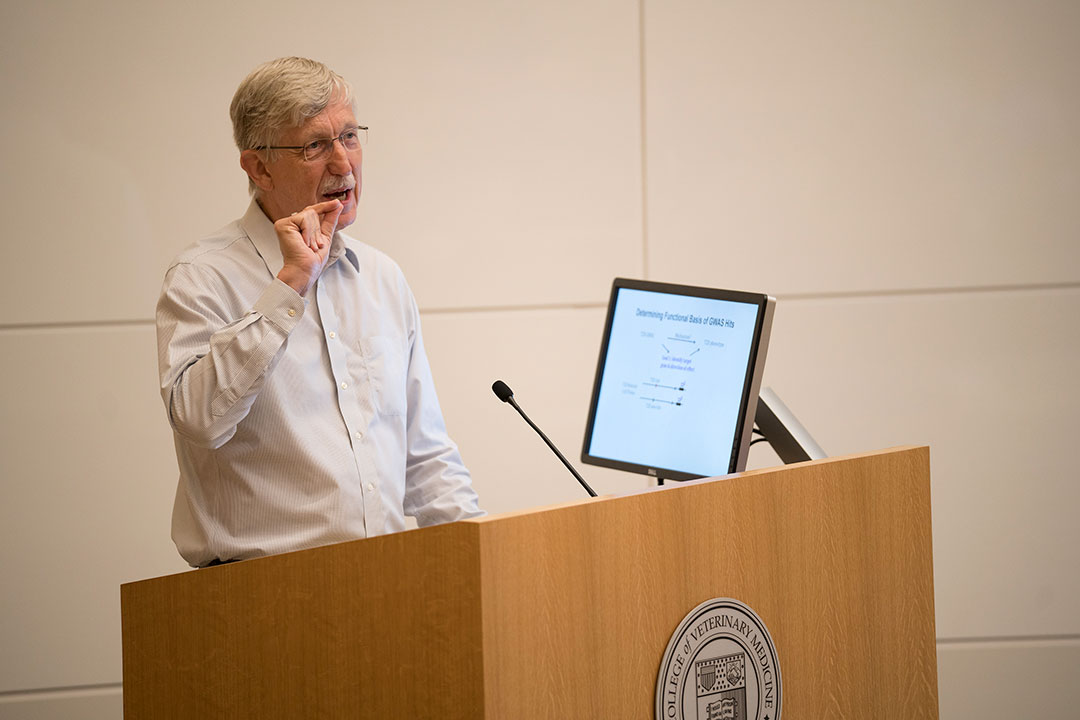Genomics research symposium draws scientists from Ivy League and beyond
A full house gathered for the Center for Vertebrate Genomics Symposium, co-organized this year by Dr. Praveen Sethupathy, associate professor in the Department of Biomedical Sciences, and Dr. John Schimenti, professor in the Department of Biomedical Sciences, at the College of Veterinary Medicine July 16 to exchange ideas and listen to a lineup of renowned experts in the field, including Dr. Francis Collins, director of the National Institutes of Health.
The Center for Vertebrate Genomics, directed by Schimenti, was created approximately 15 years ago to enhance research and education in vertebrate genetics and functional genomics university-wide. “The idea for the Center for Vertebrate Genomics was to connect researchers across campus with interests in a wide array of different species,” said Dr. Michael Kotlikoff, university provost and former dean of the college. Since its inception, added Kotlikoff, the center has succeeded in fostering research interactions and collaborations across the entire university.
Sethupathy introduced the lineup of speakers for the event, which comprised researchers from Cornell (Drs. Hojoong Kwak, John Lis, Nina Therkildsen,), the National Institutes of Health (Collins), Stanford University (Dr. Julie Baker), Harvard Medical School (Dr. Martha Bulyk), and U.C. San Diego (Dr. Bing Ren).
“Cornell is in an exciting phase of expansion of genomics research, and we are delighted to host on campus some of the leading scholars and innovators across the country,” said Sethupathy.
“Cornell is doing amazing things in the areas of genomics and epigenomics,” said Collins in his seminar on functional genomics and precision medicine. Collins was the director of the Human Genome Project, which ran from 1990-2003. “For me as a physician, a big part of [the Human Genome Project] dream was that we would take that information and bring it forward in ways that would benefit patients.”

Lis, the Barbara McClintock Professor of Molecular Biology of Genetics, is a National Academy of Science inductee. “Dr. Lis is a pioneer in the study of transcriptional regulation and we are grateful for his co-leadership with Dr. Rick Cerione of the Provost’s task force on genome biology,” said Sethupathy. A lecture from Ren, a world leader in genomics and gene regulation, brought the symposium to a close on a note very similar to the one rung by Collins — the continued importance of basic research in genome function and the relevance of the discoveries to personalized medicine.
The program contained a full day of rich scientific discussion, with presentations that touched on a wide array of topics including fish otoliths, the mammalian placenta, type 2 diabetes, development and cancer. The event also featured a poster session in which graduate students and postdoctoral fellows could showcase their own research; the poster session was entirely digital, with slides cycling through on laptops in the atrium.
This biennial symposium is the result of an outgrowth of the center’s monthly “Verge” meetings, a series which increases awareness among its members of the different research programs that currently exist on campus, shares up-to-date information from conferences and scientific literature and generally encourages more interaction among members.






